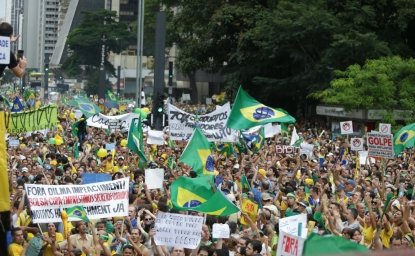The paradox of a Russian state that is outwardly strong but internally weak has persisted for centuries, from Ivan the Terrible to Mikhail Gorbachev. Vladimir Putin is the latest embodiment of this quintessentially Russian conundrum. Aggressive foreign policy has won him accolades at home and awed many around the world, yet he has been unable to influence Russia’s domestic development where it matters most for his own political fortunes — improving the daily lives of Russian citizens. Under Putin, the Kremlin’s primary response to the collapse of the Russian ruble, and with it public pensions and salaries, has been to advise people to get used to their new reality.
A credible and thoroughgoing fight against corruption would be the necessary first step in structural reform that could jumpstart the Russian economy, as many economists have prescribed. The existence of corruption on a grand scale at the highest levels of government is not news in Russia. But even the basic tools or credible resolve to fight it are lacking. Absent a miracle, like the rebound of oil prices to $100 or more a barrel, Russia’s persistent failure to address corruption will exacerbate its economic woes.
The Burden of Corruption and the Official Response
The plight of Russia’s business community is illustrative. According to the business newspaper Kommersant, Russian businesses are subject to more than 100 distinct regulatory regimes administered by 44 separate departments, leading to more than 2 million government inspections every year. Many of these reviews are scheduled by appointment and relatively straightforward. But almost half of them are unplanned, according to Russia’s ombudsman for business, Boris Titov, and they place a major financial burden on Russian business while offering corrupt officials a perfect vehicle for extortion and abuse.
Putin publically acknowledges the strain of these repeat inspections on the Russian economy. In his annual state of the nation address in December 2015, Putin noted that a “whole army of inspectors continues to hinder the operation of good businesses.” This was the fourth straight year, however, that Putin’s state of the nation address raised the problem of repeat inspections. In 2014, he complained of the “intrusive supervision and control” of Russian business that “creates problems for thousands of law-abiding, self-motivated people.” In 2013, he decried “the excess attention from inspectors,” while in 2012, he demanded greater public accountability for Russia’s supervisory organs. Putin’s proposed solution in his 2015 address was to call for the creation of a special commission on administrative reform. Alternative anticorruption measures, such as conducting a risk assessment of a particular business before formally initiating an inspection, are being considered, but no law has been adopted as yet, and implementation of any reforms may take as long as two years.
Absent a miracle, like the rebound of oil prices to $100 or more a barrel, Russia’s persistent failure to address corruption will exacerbate its economic woes.
Russia has signed on to numerous anticorruption treaties, including the Organization for Economic Cooperation and Development’s antibribery convention, the UN Convention against Corruption, and the Financial Action Task Force anti–money laundering recommendations. A requirement that Russian bureaucrats submit annual income declarations has led, on a relatively small scale, to firings and disciplinary actions, and Putin announced in the 2015 state of the nation address that state and municipal officials will now be required to file similar declarations to address potential conflicts of interest.
Factors against Reform
In today’s economic crisis, when Russian officials are thirsting for revenue, it is hard to see how they can forego the money generated through inspections. Over the past year, tax inspections have actually become more intrusive and demanding, not less, according to a survey by the accounting firm KPMG.
Despite pronouncements from the top, there appears to be little political will to confront the roots of Russian corruption. Although both Putin and Titov have called on the Russian prosecutor’s office, which is central to the prevailing system of law enforcement, to lead the fight against corruption and to safeguard the business community from abusive investigations, many Russians would be quick to pinpoint prosecutors themselves as part of the problem. Yury Chaika, head of the prosecutor’s office, was recently the subject of a scathing video documentary by Alexei Navalny, who accused Chaika of abusing his authority to support his son’s nefarious business ventures. So far, these charges have been swept under the table, and Chaika remains firmly in charge.
The application of Russia’s anticorruption efforts seems to protect politically favored individuals. When the governor of the Komi republic, Vyacheslav Gaizer, was arrested in September 2015 on fraud charges, the political rumor mill attributed his fall to his running afoul of Igor Sechin, the head of the state oil company Rosneft. Gaizer’s successor as acting governor of Komi, Sergei Gaplikov, is no poster child for transparency, efficiency, or accountability. He had presided, as the head of the state monopoly that managed construction for the 2014 Sochi Olympics, over alleged corruption and cost overruns estimated to have more than doubled Russia’s cost of hosting the games to $50 billion.
A Voice for Reform
Former Russian finance minister Alexei Kudrin has been the leading voice campaigning for needed reforms, and he now has formally agreed to serve as chairman of the board of the Center for Strategic Research, a think tank with strong ties to President Putin. No doubt this appointment will encourage Western investors, since during his 11-year tenure starting in 2000, Kudrin championed foreign investment and was credited with accumulating a “stability fund” of some $700 billion, which allowed the country to weather the 2008 global financial crisis relatively intact.
Presidential Administration chief Sergei Ivanov announced that imposing anticorruption standards that individual countries are not prepared to accept is not just inappropriate, but even harmful.
Kudrin’s specific mandate, however, is to prepare a development strategy for after 2018, implying that no major reforms will take place until after Putin’s reelection. Moreover, Kudrin’s lack of a shared background in the security services with Putin, Sechin, and other so-called siloviki clearly will handicap any efforts to influence the levers of state power that permit or prevent official corruption. In 2008, for example, Kudrin could not prevent the siloviki from leveling dubious criminal charges against his own team of economic reformers when Putin’s temporary hand-off of the presidency to Dmitry Medvedev provoked a behind-the-scenes power struggle.
The Smoke Screen of Global Aggression
With tensions between Russia and the West running high, Russia’s global ambitions and bristling notions of sovereignty seem to provide a blanket excuse for official inaction on corruption. At a major UN conference held in St. Petersburg last November, Presidential Administration chief Sergei Ivanov announced that imposing anticorruption standards that individual countries are not prepared to accept is not just inappropriate, but even harmful. Russia has yet to adopt Article 20 of the UN Convention against Corruption, which criminalizes illicit enrichment by government officials.
A Russia that projects power abroad may impress some as a powerful state, and there can be no doubt that thanks to its military intervention in the Middle East, Russia has won a seat at the table in Syria and against the Islamic State. Yet Russia is in danger of losing its footing if the foundation of state power and influence in the 21st century is a growing economy that empowers innovation and attracts foreign investment. No matter how often Putin and his retainers pay lip service to anticorruption reforms, it seems clear that the Russian state cannot and will not mount a serious fight against the biggest enemy of its own long-term success.
The opinions expressed here are solely those of the authors.
William Pomeranz is deputy director of the Kennan Institute. He has written extensively on Russian constitutional and commercial law and Russian legal history. He also heads up the Wilson Center’s Rule of Law Initiative. Matthew Rojansky is director of the Kennan Institute. He is an expert on U.S. relations with the states of the former Soviet Union, especially Russia, Ukraine, Belarus, and Moldova, and has advised governments, intergovernmental organizations, and major private actors on conflict resolution and enhancing shared security throughout the Euro-Atlantic and Eurasian region.







